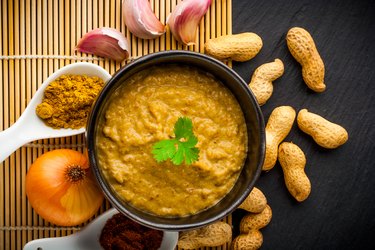
Peanut sauce is a popular accompaniment to satay, grilled chicken or tofu and a wide variety of Asian-inspired dishes, particularly dishes from Thailand. While most peanut sauces do contain nutrient-packed ingredients, they're also high in calories and fat, making them healthy choices -- but only in moderation. There are certainly more nutritious and lower-calorie alternatives to peanut sauce, but if you stick to small servings, the sauce won't harm any diet plans.
Calories
Video of the Day
A full cup of Thai peanut sauce has more than 700 calories, 55 g fat, 1,350 mg sodium, 35 g carbohydrates and nearly 35 g protein. That's a hefty serving from a nutritional standpoint, but having a more moderate amount of sauce comes with more reasonable values. Two tablespoons of peanut sauce has only 45 calories, about 3.5 g fat, 85 mg sodium, 2 g carbohydrates and 2 g protein.
Video of the Day
Ingredients
Peanut sauce is so heavy on the calories and fat because of what it traditionally contains. The base is full-fat coconut milk, with full-fat peanut butter and ground peanuts added. The sauce may also contain brown sugar or honey, soy sauce and oil, which can raise its sugar and sodium contents. The June 2000 issue of "Cooking Light" magazine suggests making a healthier, lower-calorie and lower-fat version of peanut sauce by using light coconut milk, reduced-fat peanut butter and just 2 tsp. sugar with lime juice and fresh cilantro to add flavor and enhance texture.
Alternatives
If you tend to go overboard when serving up condiments, peanut sauce is not the healthiest choice because those calories and fat grams can add up quickly. Lower-calorie alternatives are pureed eggplant or tomato sauces with spices and light coconut milk. A black bean sauce will keep protein levels high but stay low in fat and overall calories. If you're making a dish for which marinara sauce would work, go for it: a full cup of that sauce contains only 80 calories, 2 g fat, 14 g carbohydrates, 6 g sugar and 2 g protein.
Considerations
It's also important to think about what you're eating with that peanut sauce. Skinless poultry or tofu and fresh vegetables won't add many calories to the dish and will give you a healthy dose of protein, vitamins and minerals, but pouring the sauce onto a food that's already high in fat, such as beef or sautéed noodles, could add hundreds more calories and a dozen or more fat grams. If you're watching your weight, keep serving sizes small and make sure your plate has balance with items from several different food groups.